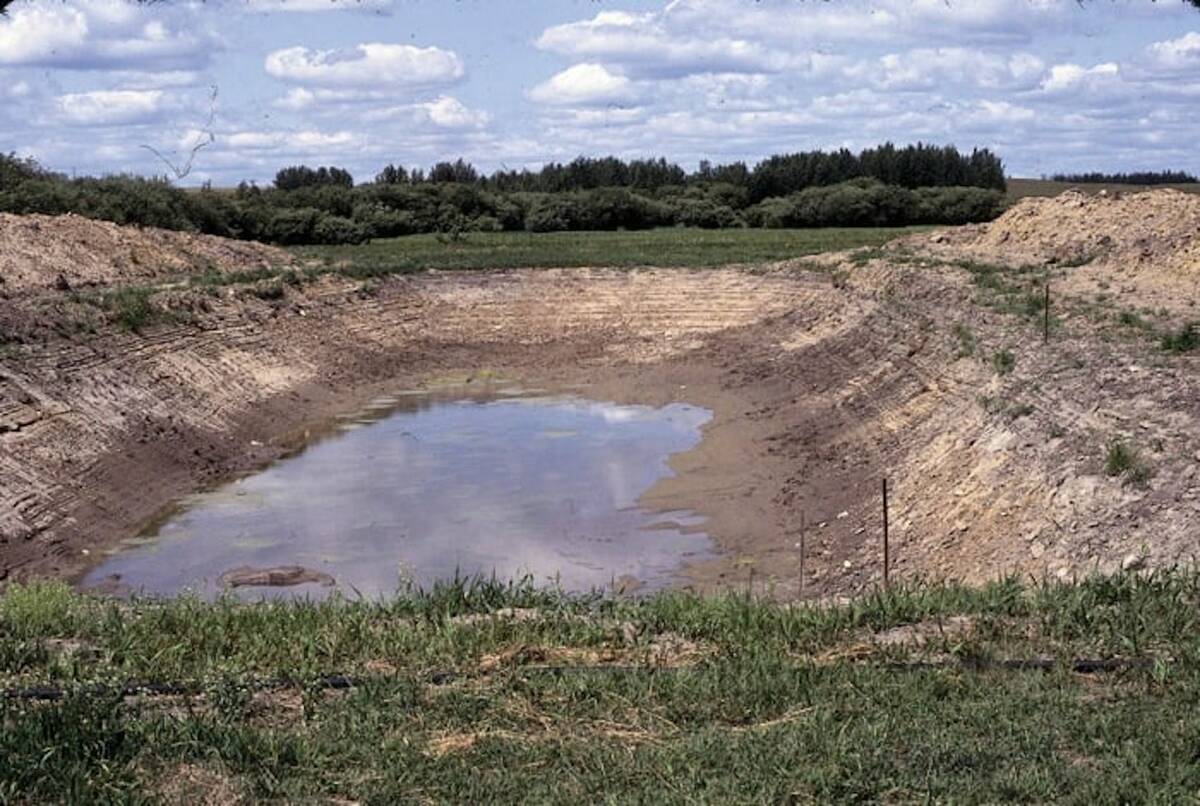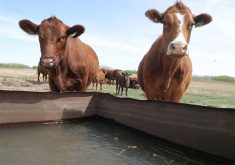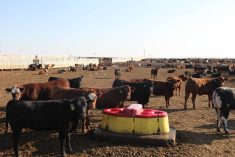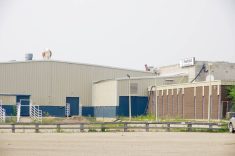Since the announcement that a cow infected with bovine spongiform encephalopathy had been discovered in northern Alberta, Canada’s international beef trade has halted and the multibillion dollar industry is teetering near collapse.
Market-ready cattle are being held back at feedlots and on the farm as processors slow production lines to meet domestic needs, truckers wait for business and auction yards sell a fraction of their usual offering. The impact is felt most in Alberta, where about three-quarters of the nation’s beef industry lives.
The reeve
Read Also

Dry summer conditions can lead to poor water quality for livestock
Drought conditions in the Prairies has led to an decrease in water quality, and producers are being advised to closely monitor water quality for their animals.
Wayne Daniels is a cow-calf producer and the reeve of the County of Newell where Lakeside Packers and its 75,000 head feedlot is located. As a farmer and local politician, he worries for his constituents more than himself.
“Right now I have a few cull cows to sell but you can’t sell them, so you keep them and feed them. But the impact isn’t as great for me as the feedlots,” he said.
While the county has a prosperous oil and gas sector, agriculture is the economic driver and if a plant like Lakeside closed, the entire county would shudder.
Schools, local businesses, recreational facilities and hamlets are all affected. While five families moving out of Medicine Hat because of plant layoffs would not be felt, a similar loss would devastate Daniels’ home town of Rolling Hills.
“People tend to ignore the small areas but there is a huge impact. Five people gone from Rolling Hills would have a huge impact.”
The trucker
On May 20, seven buyers were scheduled to look at Doug Dafoe’s cattle. No one showed because that day Canada announced its first case of homegrown BSE and all beef business stopped.
The deepening BSE crisis has slammed Dafoe from both sides.
He owns a cattle hauling business at Rainier, Alta., with Lakeside Packers being the best customer for his eight-truck fleet.
The cattle trucks go on short runs from Lakeside Feeders on the south side of the Trans-Canada Highway, across the road to the slaughter house. He is licensed to haul cattle in the three prairie provinces but work is slow and his staff waits for the phones to ring.
“You can’t tell the guys to go take a week off because there is nothing going on this week. The phone might ring and you have customers you have to take care of,” he said.
Lakeside also kills a small number of cull cows each week but Dafoe expects that trade will dry up as well once this crisis is resolved. He suspects no animals older than 30 months will enter the plant for beef.
The feedlots
Not content to watch another day of high beef prices go by, a group of southern Alberta feedlot operators decided to take action.
They called their friend Garnett Altwasser, president of Lakeside Packers and offered him a proposition.
Sell them a load of ground beef at cost and they would sell it themselves from the roadside if necessary.
The group pulled into a parking lot in Vulcan and within five hours, sold 50,000 pounds of frozen ground beef for $1 a pound.
Ranging from 10 pound chubs to 80 lb. case loads, the beef was sold to anyone with cash or cheque.
“We are in real hard times here. We have to do something,” said Rick Paskal of Iron Springs.
All the feeders loading beef into people’s cars agreed that an interest-free loan from the federal government is not the answer to their dilemma. They have more than 300,000 cattle ready to market by July 1.
“We just need to get that border to open up,” said Harry Duban of Picture Butte.
The cowboys
At age 75, Tom Livingston of Duchess, Alta., grimly remembers when foot-and-mouth disease closed Canada’s borders in 1952.
“This is more serious this time round. With foot-and-mouth we could eat our way out. There is no possibility we can do that now. We export 60 percent of what we produce,” he said.
Merle Wyatt, a purebred breeder and cow-calf producer near Vulcan, is also worried about steers he cannot sell and what the situation could be like later this summer and fall.
“It’s a good thing the bull sales were held early. Everything has been put on hold. People are a bit scared,” he said as he helped cook burgers at a rally to support Alberta beef producers in Vulcan.
The support has come in many ways, said Wyatt, who is also a delegate to Alberta Beef Producers.
Local 4-H sales have held strong, with the recent steer sale in Vulcan earning record money for members.
Rallies supporting Alberta beef producers have appeared across the province with anywhere from 1,000 to 5,000 people appearing to lift producers’ morale.
The beef rally
With 5,000 donated beef patties and a hungry throng of more than 3,000 waiting to be entertained by country singer Ian Tyson, Vulcan Ford dealer Byron Smith got what he wanted.
He wanted national media attention to show eastern politicians the depth of concern for Western Canada’s cattle industry since BSE closed the border.
The rally is one of many springing up across Alberta as volunteers promote the homegrown product.
Smith planned the rally at his car lot as a lunch hour barbecue, but decided it had to be bigger. As a motivational speaker who scaled Mount Everest in 2000, he decided to call in favours and used his contacts to build the rally.
“This was tougher than climbing Mount Everest,” he said. His car lot is already feeling the effect as people cut back on spending.
“Every one of us is affected by this devastation in the cattle industry,” he said.

















